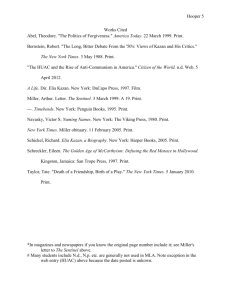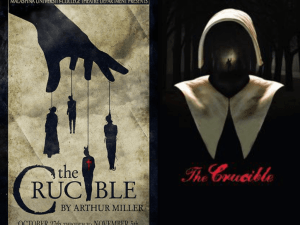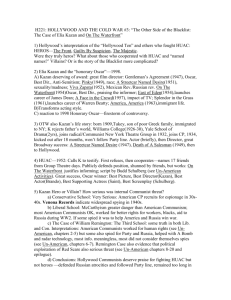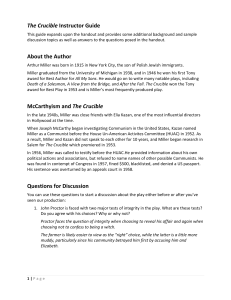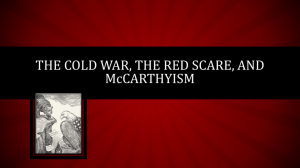The Hollywood Blacklist and Its Influence on The Crucible
advertisement
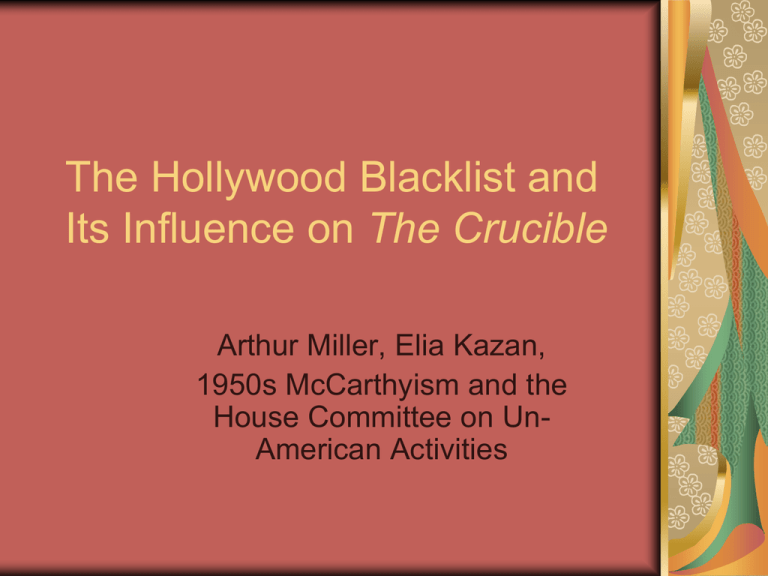
The Hollywood Blacklist and Its Influence on The Crucible Arthur Miller, Elia Kazan, 1950s McCarthyism and the House Committee on UnAmerican Activities Arthur Miller (1915-2005) One of America’s greatest playwrights Penned The Crucible and Death of a Salesman, among other works Born in New York, Miller studied journalism at The University of Michigan before returning to NYC Miller met Elia Kazan, a man who would become his closest friend, while working with the Federal Theatre Project Elia Kazan (1909-2003) A celebrated director and producer of major motion pictures. Directed A Streetcar Named Desire, On the Waterfront, among other works. Kazan and Miller teamed up in NYC in creative collaboration: Miller wrote the scripts; Kazan directed them. The Hook The Great Depression left many Americans wondering about the stability of US policy, and influenced the two men to explore socialist and communist ideologies. After attending some informational meetings, Kazan joined the communist party (and later left); Miller did not join. Miller and Kazan witnessed mobsters monopolizing jobs on the Jersey docks as workers, desperate for income, were exploited. This served as the inspiration for their collaborative play The Hook, a story about one man’s struggle against injustice on the docks. Miller and Kazan move to Hollywood, taking their script with them. Senator Joe McCarthy (R) Wis Americans in the 1940s and 50s were fearful of Communism, and Senator Joe McCarthy validated that fear with an organized interrogation committee. McCarthy became and remains famous for his single-minded obsession with identifying and interrogating supposed communist sympathizers, particularly in the media. McCarthyism (n.) The practice of publicizing accusations of political disloyalty or subversion with insufficient regard to evidence. The use of unfair or unscrupulous investigatory or accusatory methods in order to suppress opposition. House Committee on Un-American Activities HUAC, McCarthy’s committee, identified 19 communist party members in Hollywood. HUAC called in the “Hollywood Ten” (all communist party members) to testify, and to name other communists they know. The Blacklist begins. Elia Kazan was among those later called to testify. At first he resisted the pressure, but eventually he named 17 communists, all of whom had been previously named by someone else. The Hollywood Blacklist All individuals who testified before HUAC were asked to identify other people they knew from communist meetings. The list grew and grew. Hollywood was torn by mistrust and worry. Many people found themselves mysteriously out of work once their names were mentioned. A publication entitled Red Channels began to circulate. Red Channels identified all the most recently identified “communists” in Hollywood. Arthur Miller/Elia Kazan Arthur Miller was troubled by the Hollywood Blacklist and his friend Elia Kazan’s decision to testify in front of HUAC and name fellow party members. Kazan agreed in 1952 to testify a second time, and this was enough to sever his friendship with Miller. Miller, greatly troubled by the current state of government in Hollywood, travelled to the east coast, where he got the idea to align the Blacklist with the Salem Witch Trials of 1692. The Crucible The Crucible is an allegory for the 1950s politics in Hollywood and the investigations of HUAC. The play was met with mixed reviews. The actress who played Elizabeth Proctor at its premier was blacklisted immediately. Miller Appears Before HUAC When Arthur Miller applied for a passport in 1956, HUAC used this as a reason to subpoena him. He appeared before the committee, but would not give any information and was found in contempt. This was reversed in appeals court. The Resolution In the end, Miller and Kazan reconciled with the help of Marilyn Monroe, Miller’s then wife and Kazan’s previous girlfriend. They eventually worked together as a writing/directing team again on a collaborative piece entitled After the Fall. In 1999, Kazan was awarded the lifetime achievement Oscar for his years of work in Hollywood. Some opposed his award, saying he was only able to keeping working at the expense of those he named in front of HUAC. Despite his feelings about Kazan’s testimony, Miller supported Kazan receiving the Oscar. Links He may be a communist http://www.youtube.com/watch?v=AWeZ5SKXvj8& feature=related http://www.youtube.com/watch?v=anNEJJYLU8M &feature=related http://www.youtube.com/watch?v=5N3WJXK2PA M&feature=related http://www.youtube.com/watch?v=FQQaX2h1plo
